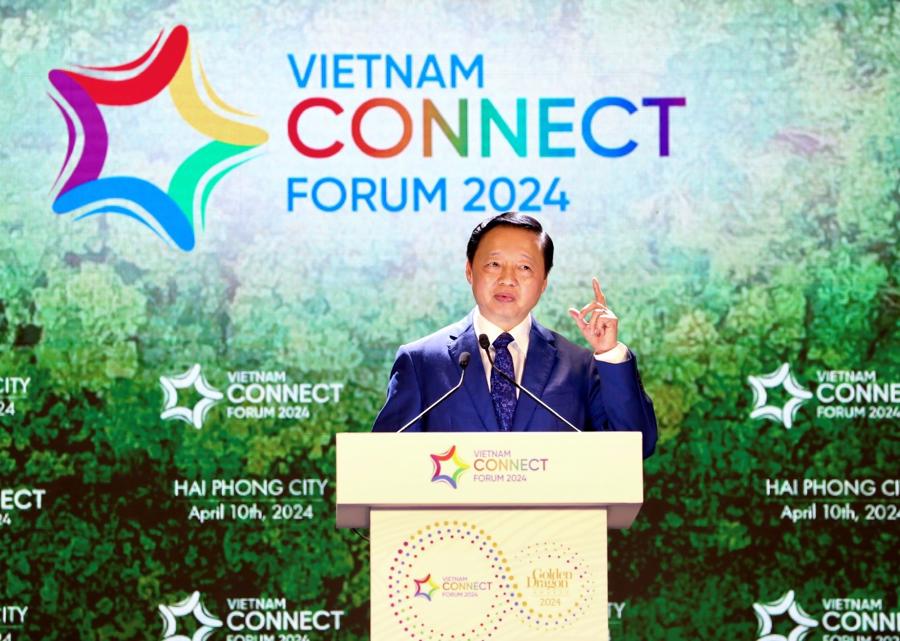Vietnam’s Green Transformation Agenda Takes Center Stage
The bustling port city of Hai Phong played host to the 4th Vietnam Connect Forum, a resounding success that underscored the nation’s unwavering commitment to sustainable development and its pivotal role in the global green economy revolution.
With over 300 participants in attendance, representing government officials, business leaders, and international organizations, the event provided a comprehensive platform to chart the course for Vietnam’s green transformation.
At the forefront of the discussions was the Vietnamese government’s ambitious plan to transition the country towards a green, low-carbon future.
Deputy Prime Minister Tran Hong Ha set the tone, emphasizing the global imperative for economic models that move beyond the exploitation of natural resources. “The world’s greatest challenge is the challenge of choice on the model of growth, and it is time for us to see that the paradigm has evolved,” he declared.

Harnessing the Collective Expertise
The Forum’s diverse lineup of speakers offered a multifaceted perspective on Vietnam’s green transformation agenda, drawing upon the collective expertise and experiences of government agencies, local authorities, businesses, and international organizations.
Mr. Le Anh Quan, Vice Chairman of Hai Phong City People’s Committee, shared the city’s pioneering efforts in implementing green industrial parks and eco-industrial zones.
“Hai Phong is one of the localities that focused very early from the implementation of investment projects in industrial parks and economic zones attracting foreign investor projects that have been interested and focused by the city’s leaders to implement green growth operations,” he said.
Since 2010, Hai Phong has worked closely with Japanese cities to research and develop these eco-friendly industrial hubs.
By 2023, the city had established a steering committee to direct the implementation of green growth and sustainable development, with a focus on four key pillars: green industrial parks and economic zones, seaports and logistics, technology industries, and commercial tourism.
“Currently, in the investment attraction orientations of the city associated with green development, investors are often interested in investing,” Mr. Quan reported. “In the past 3 years, Hai Phong has attracted $10.5 billion of FDI; 2021 is the year Hai Phong ranked first in attracting FDI of $5.3 billion.”
The business community also played a prominent role in the discussions, with leaders from multinational companies offering their perspectives and experiences. Mr. Bruno Jaspaert, General Director of Deep C Industrial Park Complex, emphasized the need for a level playing field and a supportive legal framework to drive sustainable development.

“Vietnam is still working to have the right legal framework for sustainable development, but the law is not ready yet, so it needs to change. Deep C is also striving to become a sustainable industrial park. However, we don’t have any financial or technological support to do that. Therefore, I believe that the development of a new legal framework is something that needs to be done,” he said.
Financing the Green Transition
The critical role of finance in facilitating the green transformation was a key focus of the Forum, with representatives from leading banks sharing their commitments and strategies.
Ms. Lam Thuy Nga, Country Director of Large Corporate Clients at HSBC Vietnam, underscored the bank’s dedication to supporting Vietnam’s sustainable development.
“Green finance is an indispensable element in the journey of green transformation and sustainable development in Vietnam,” she said, highlighting HSBC’s $750 billion to $1 trillion in financing solutions to support customers worldwide in transitioning to more sustainable practices.
“Not only accompanying corporate customers, HSBC can also offer many solutions to support individual customers on their journey towards ‘Net zero’, especially young customers,” Ms. Nga added.
This includes green credit packages for rooftop solar installations and green home loans for certified eco-friendly buildings, as well as the bank’s use of recycled materials for payment cards to promote sustainable consumer choices.
Mr. LIM Dyi Chang, UOB Vietnam’s Commercial Banking Head, echoed this sentiment, stating, “We are committed to achieving net-zero emissions across our entire business by 2050, and by the end of 2023, our green finance portfolio has reached a size of $350 billion.”
Bridging the Gap between Policy and Implementation
Recognizing the need to bridge the gap between policy and implementation, the Forum hosted a signing ceremony of a Memorandum of Cooperation between the Department of Climate Change, Ministry of Natural Resources and Environment, and Vietnam Economic Times.
As explained by Editor-in-Chief Chu Van Lam, the partnership aims to “coordinate the implementation of activities to raise awareness, capacity and action towards the Net-Zero target of Vietnam.”
This includes policy communication programs, research and development of indicators to evaluate the implementation of net-zero goals, and the organization of forums and seminars to facilitate dialogue and feedback on the green transition.

“This conference needs to move beyond mere discussion and focus on how we can assist the government in fulfilling its mission,” the Deputy Prime Minister had emphasized earlier.
“We must listen to businesses, citizens, and all stakeholders to drive innovation and optimize collaboration between the government, localities, businesses, and the public.”
Empowering Businesses and Citizens as Agents of Change
The Forum also highlighted the critical role that businesses and citizens must play in driving Vietnam’s green transformation. Mr. Joseph Uddo, President of AmCham Hanoi, expressed the U.S. business community’s enthusiasm to contribute to Vietnam’s sustainable transition.
“We look forward to working directly with the Government to reduce administrative burdens, as well as reduce risks associated with some elements of the energy transition in Vietnam,” he said.
Mr. Bui Khanh Nguyen, Deputy General Manager of External Affairs, Communications and Sustainable Development at Coca-Cola Vietnam, emphasized the need for coherent policies and consumer awareness to support the green transition.
“For Vietnam’s green economy to take off, it takes a lot of factors. The first is the Government’s orientation through the creation of policies to support the transition to a green economy,” he said. “But many obstacles for businesses lie in incentive policies.
For example, when businesses perform many responsibilities at the same time such as collecting and recycling packaging, if introduced and implemented at the same time as other taxes, it will create a relative burden on businesses that will reduce the competitiveness of businesses in the market.”
Collective Commitment and Collaborative Approach
The Vietnam Connect Forum 2024 underscored the collective commitment of government, businesses, and international organizations to Vietnam’s green transformation agenda. By harnessing the diverse expertise and experiences of the participants, the event laid the groundwork for a collaborative approach that will be crucial in driving the country’s sustainable development goals.
Mr. LIM Dyi Chang of UOB Vietnam emphasized the importance of this collaborative spirit, stating, “Compared to developed economies, Vietnam has many favorable conditions to transition to a green economy. In developed countries, the transition is relatively more difficult as they have invested in building stable infrastructure over the years. For Vietnam, in the context of a developing economy and improving infrastructure, the transition to a green economy will be easier.”












